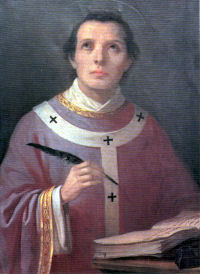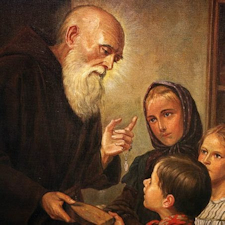Easter: April 21st
Optional Memorial of St. Anselm, bishop & doctor
Other Commemorations: St. Conrad of Parzham, OFM Cap
» Enjoy our Liturgical Seasons series of e-books!
St. Anselm (1033-1109) was born in Aosta, Italy, and died in Canterbuy, England. St. Anselm's services to the Church are principally the following: First, as Archbishop of Canterbury he defended the rights and liberties of the Church against the encroachments of the English kings, who plundered the Church's lands, impeded the Archbishop's communications with the Holy See, and claimed the right to invest prelates with ring and crosier, symbols of the Church's spiritual jurisdiction. Second, as a philosopher and theologian he developed a method of reasoning which prepared the way for the great thinkers of the Middle Ages. Third, he had a great devotion to Our Lady and was the first to establish the feast of the Immaculate Conception in the West.
St. Anselm
As prior and abbot, Anselm made the Benedictine monastery of Bec the center of a true reformation in Normandy and England. From this monastery he exercised a restraining influence on popes, kings, the worldly great, and entire religious orders. Raised to the dignity of Archbishop of Canterbury and primate of England, he waged a heroic campaign in defense of the rights and liberties of the Church. As a result he was deprived of goods and position and finally banned from the country. He journeyed to Rome, and at the Council of Bari supported Pope Urban II against the errors of the Greeks. His writings bear eloquent testimony to his moral stature and learning, and have earned for him the title of "Father of Scholasticism."
—The Church's Year of Grace, Pius Parsch
 St. Anselm exhibited remarkable versatility in his life; a combination of contemplation, prayer, study, writing, and external activity. This was partly the result of the extraordinary talent that God gave him, but it was likewise the fruit of Anselm's faithful exercise of his talent in the study of natural and supernatural truths. But his chief merit lay in his earnest, conscious effort to live in accordance with what he had learned from the study of divine truths. By this means he was able to ascend to the heights of a life of faith and union with God. There is very much that we can learn from this great teacher. "Lord, I do not presume to fathom the depths of your truths, for my understanding is not equal to the task. Nevertheless, I desire to learn Your truths in some measure—those truths that I believe and love. I do not seek to gain knowledge so that I can believe; rather, I believe so that I may gain knowledge. No matter how persistently my soul gazes, it still beholds nothing of Your beauty; my soul listens intently, and yet it hears nothing of the learning of Your Being; my soul wants to breathe in Your fragrance, and yet perceives none of it. What are You, Lord? Under what image can my heart recognize You? Truly, You are life; You are truth; You are Goodness; You are Holiness; You are eternity; You are everything good! O man, why do you roam about so far in search of good things for soul and body? Love the one Good, in whom all goods are contained, and that will satisfy you!" (St. Anselm).
St. Anselm exhibited remarkable versatility in his life; a combination of contemplation, prayer, study, writing, and external activity. This was partly the result of the extraordinary talent that God gave him, but it was likewise the fruit of Anselm's faithful exercise of his talent in the study of natural and supernatural truths. But his chief merit lay in his earnest, conscious effort to live in accordance with what he had learned from the study of divine truths. By this means he was able to ascend to the heights of a life of faith and union with God. There is very much that we can learn from this great teacher. "Lord, I do not presume to fathom the depths of your truths, for my understanding is not equal to the task. Nevertheless, I desire to learn Your truths in some measure—those truths that I believe and love. I do not seek to gain knowledge so that I can believe; rather, I believe so that I may gain knowledge. No matter how persistently my soul gazes, it still beholds nothing of Your beauty; my soul listens intently, and yet it hears nothing of the learning of Your Being; my soul wants to breathe in Your fragrance, and yet perceives none of it. What are You, Lord? Under what image can my heart recognize You? Truly, You are life; You are truth; You are Goodness; You are Holiness; You are eternity; You are everything good! O man, why do you roam about so far in search of good things for soul and body? Love the one Good, in whom all goods are contained, and that will satisfy you!" (St. Anselm).
Symbols and Representation: Benedictine monk admonishing an evil-doer; archbishop performing an exorcism on a monk; with a ship; with Our Lady appearing before him
Highlights and Things to Do:
- Read more about St. Anselm:
- St. Anselm's relics are mainly located in the Canterbury Cathedral
- Learn more about St. Anselm and his works at the Internet Encyclopedia of Philosophy.
- You can find the works of St. Anselm at the Christian Classics Ethereal Library, click on Anselm.
- Check out the Catholic Culture library for various talks and writings on St. Anselm, including by Pope Benedict XVI.
- Those who are truly ambitious might tackle this 2 volume set by Martin Rule published in 1883: The life and times of St. Anselm, archbishop of Canterbury and primate of the Britains, Vol. 1 and Vol 2.
St. Conrad of Parzham, OFM Cap
 Born on December 22, 1818, he was baptized with the name of John and was born on the family farm in Germany. He was the ninth son in a peasant family. From an early child, St. Conrad gave indications of his future sanctity by his modesty and love of solitude. His devotion was noticeable especially when he prayed in the Church. The Church was a long way off, and he visited often, even in inclement weather. He was especially close to the Blessed Virgin, and daily recited the Rosary. On feast days, he would make long, remote journeys to a Shrine of the Blessed Mother. He would return late at night on foot and still fasting. He lost his mother at the age of 14 and spent his time helping on the family farm. At 31, after his father’s death, he entered the Capuchin Franciscan Friars and was given the name Conrad.
Born on December 22, 1818, he was baptized with the name of John and was born on the family farm in Germany. He was the ninth son in a peasant family. From an early child, St. Conrad gave indications of his future sanctity by his modesty and love of solitude. His devotion was noticeable especially when he prayed in the Church. The Church was a long way off, and he visited often, even in inclement weather. He was especially close to the Blessed Virgin, and daily recited the Rosary. On feast days, he would make long, remote journeys to a Shrine of the Blessed Mother. He would return late at night on foot and still fasting. He lost his mother at the age of 14 and spent his time helping on the family farm. At 31, after his father’s death, he entered the Capuchin Franciscan Friars and was given the name Conrad.
After his profession, he was sent to the Friary of St. Ann in Altotting. The friary served the Shrine of Our Lady of Altotting, the National Shrine of the Blessed Mother in Bavaria. It was here that St. Conrad was given the position of porter at the Shrine, and he retained it until his death. Because of the size of this city, and the many pilgrims, the duty of a friary porter was a difficult one. Conrad was known to be diligent at his work, sparing in words, bountiful to the poor, and eager to help strangers. He served in this position to the town’s people for forty years, fulfilling their needs of body and soul.
St. Conrad loved silence in a special way, and his spare moments during the day were spent in a nook near the door, where it was possible for him to see and adore the Blessed Sacrament. He was known for depriving himself of sleep, to spend time with Jesus in the Church or Oratory in prayer. It was the general belief of his fellow friars, that he never slept, but continually occupied himself in his duties and devotion. On April 21, 1894, St. Conrad died in the friary where he had served for 41 years. During his lifetime, Brother Conrad was known to have the gift and ability to read the hearts of those he met and was attributed with the gift of prophecy. His heroic virtues and the miracles he performed won for him canonization by Pope Pius XI in 1934.
Practical Take Away
St. Conrad was born John, in Bavaria, now modern-day Germany. He was the ninth son of a farming family, and after losing his parents he entered the Capuchin Friars. He was sent to the National Shrine of the Blessed Virgin Mary and took the position of Porter. He had the ability to work miracles and was able to read the hearts of those he met, as well as the gift of prophecy. He was believed by his fellow Brothers, to never have slept, rather spent his time with his duties or in devotion at the Chapel. He practiced heroic virtues that won for him the title of saint and was canonized in 1934 by Pope Pius XI.
—Excerpted from The Newman Connection
Patronage: Capuchin-Franciscan Province of Mid-America; Catholic Student Association; doorkeepers; diocese of Passau, Germany (since 1984)
Highlights and Things to Do:
- Read more about St. Conrad:
- Read more about the Capuchin Franciscans--Province of St. Conrad.
- During his life, the Capuchins served the Shrine of Our Lady of Altötting. St. Conrad's relics are located at the the Shrine (German site).






